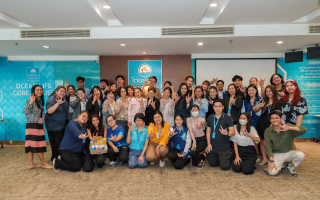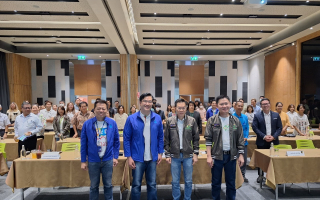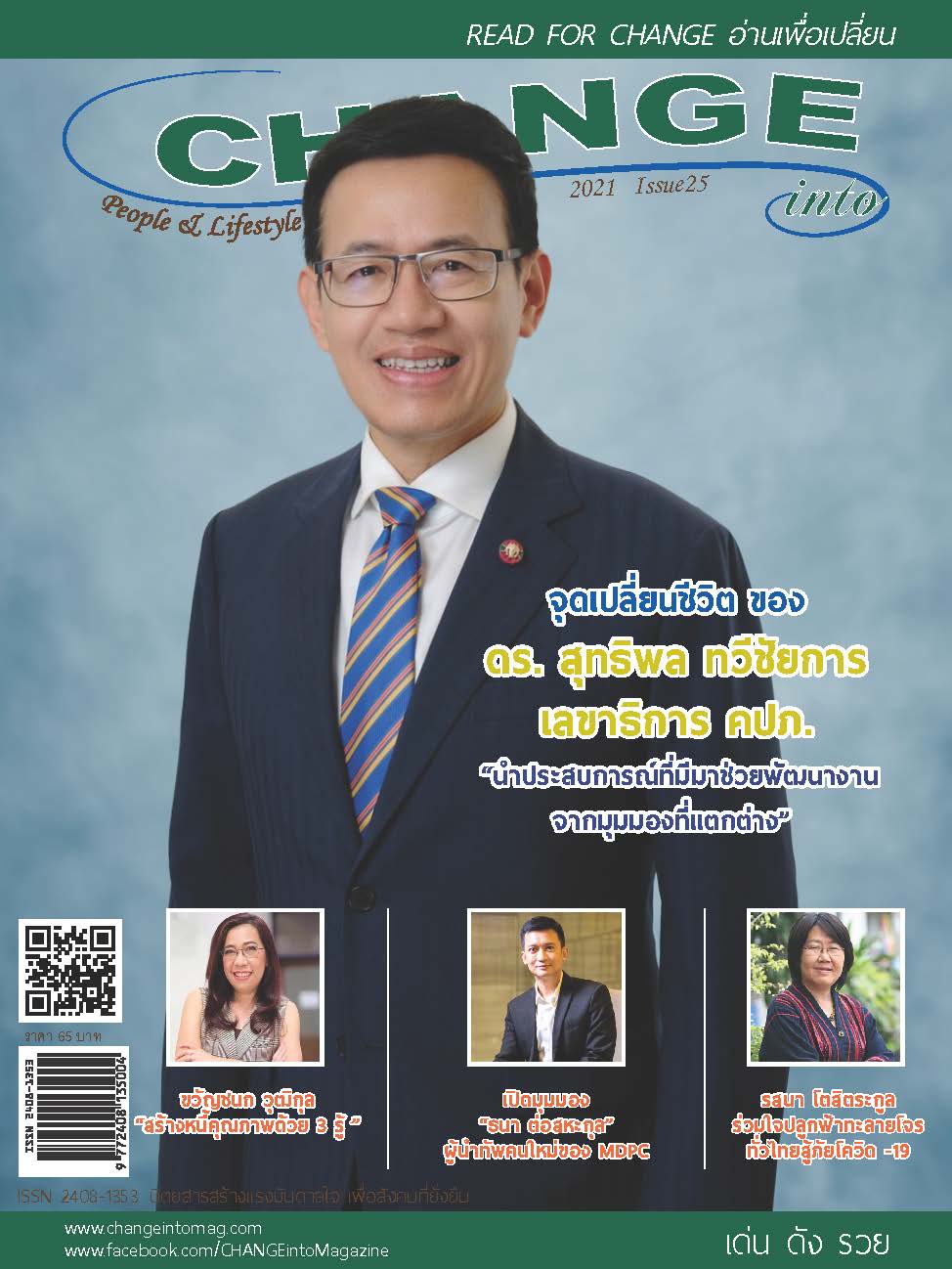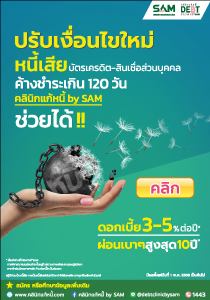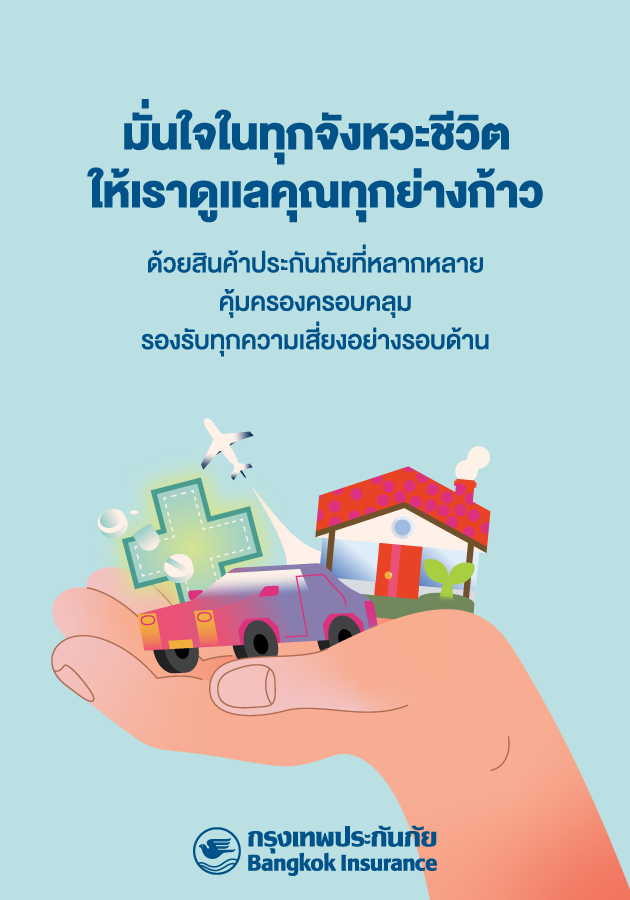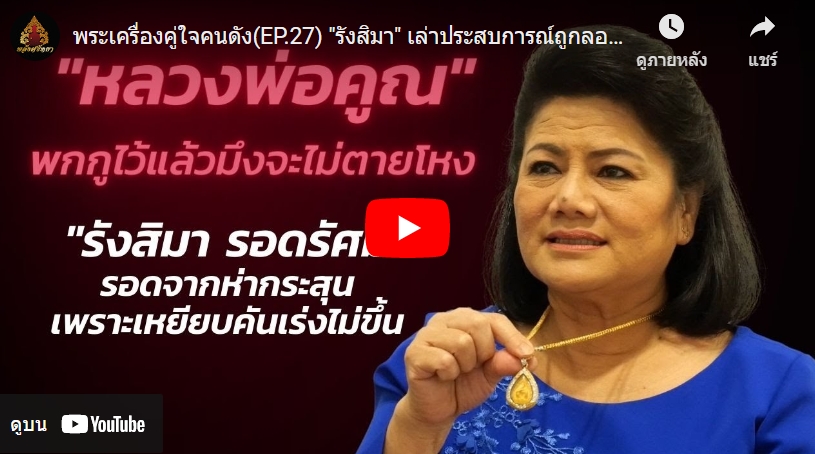เคแบงก์ ไพรเวทแบงกิ้ง จับตาเศรษฐกิจไทย
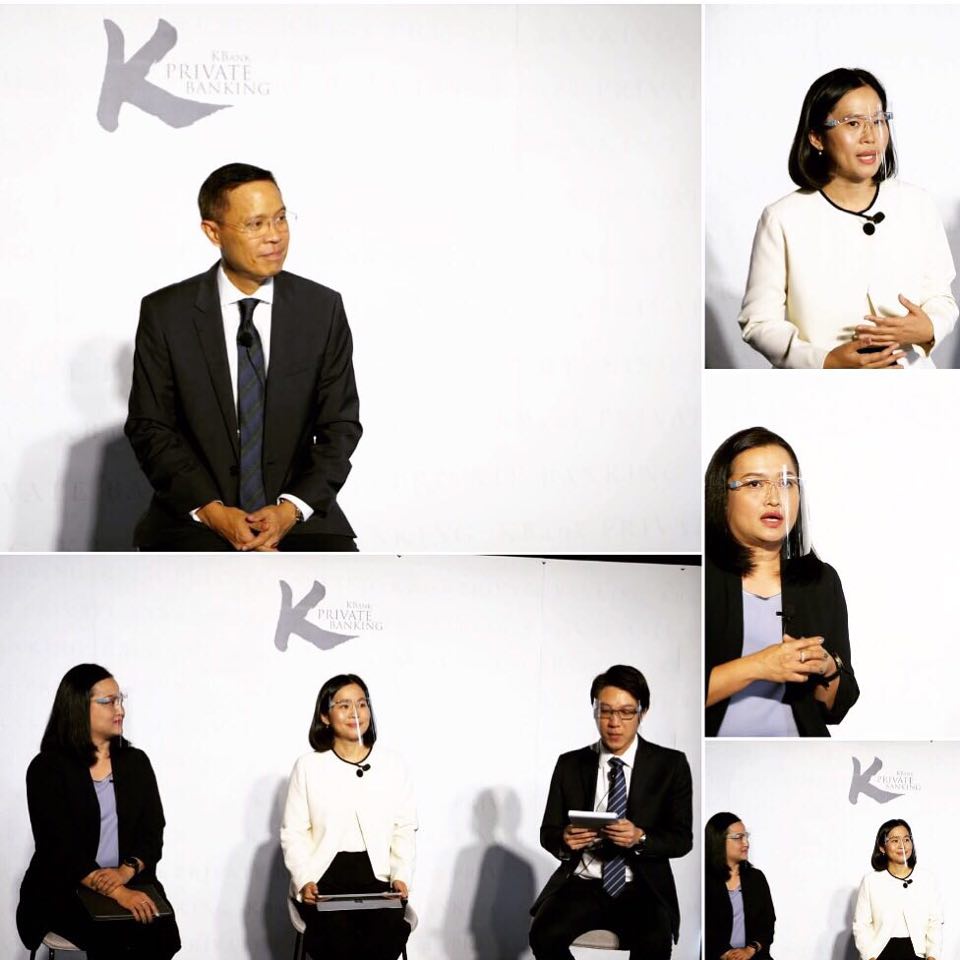
เคแบงก์ ไพรเวทแบงกิ้ง จับตาเศรษฐกิจไทย
พร้อมเจาะลึกนโยบายรัฐหลังโควิด19ระบาดระลอกใหม่ เผยโอกาสลงทุนในหุ้นผู้ชนะ
KBank Private Banking(เคแบงก์ ไพรเวทแบงกิ้ง) ร่วมกับ ศูนย์วิจัยกสิกรไทย จัดงานสัมมนาออนไลน์ “ทางรอดเศรษฐกิจไทย ในวิกฤตล็อกดาวน์ที่ไม่ล็อกดาวน์”จากความกังวลต่อการแพร่ระบาดของโควิด19ในระลอกใหม่ และผลกระทบทางเศรษฐกิจไทย พร้อมจับตาความเป็นไปของเศรษฐกิจและตลาดหุ้นไทย นโยบายเยียวยาและฟื้นฟูจากภาครัฐ รวมไปถึงโอกาสการลงทุนเพื่อคว้าผลตอบแทนกับหุ้นผู้ชนะ ที่ขานรับNew EconomyในยุคNew Normal
นายจิรวัฒน์ สุภรณ์ไพบูลย์Private Banking Group Headธนาคารกสิกรไทยกล่าวว่า “จากการระบาดระลอกใหม่ของโรคโควิด19ส่งผลให้เกิดความกังวลเกี่ยวกับผลกระทบที่จะเกิดขึ้นกับเศรษฐกิจไทย รวมไปถึงภาคการส่งออกที่น่าจะได้รับผลกระทบเช่นเดียวกันจากการที่เงินบาทแข็งค่าขึ้น รวมไปถึงข่าวคราวการมาถึงของวัคซีนป้องกันโรคโควิด19ว่าจะครอบคลุมประชากรไทยมากน้อยแค่ไหน การฉีดวัคซีนจะได้ผลดี และสามารถหยุดการแพร่ระบาดได้หรือไม่ และความหวังว่าจะสามารถกลับมาใช้ชีวิตได้ตามปกติ ธนาคารฯ เข้าใจทุกๆ ความกังวลเป็นอย่างดี จึงร่วมกับศูนย์วิจัยกสิกรไทยเพื่อเปิดเผยข้อมูลสำคัญ เพื่อจะได้เตรียมตั้งรับในวิกฤตล็อกดาวน์ที่ไม่ล็อกดาวน์ในครั้งนี้”
นางสาวณัฐพร ตรีรัตน์ศิริกุล ผู้ช่วยกรรมการผู้จัดการ บริษัท ศูนย์วิจัยกสิกรไทย จำกัดกล่าวว่า “ความแตกต่างระหว่างการระบาดของโรคโควิด19ในรอบแรก และการระบาดระลอกใหม่ มีอยู่3ประเด็น คือ1) จำนวนผู้ติดเชื้อรายวันสูงกว่า2) การกระจายของผู้ติดเชื้อเป็นแบบวงกว้าง3) ต้นตอของการระบาดเกิดจากภาคอุตสาหกรรม นอกจากนี้ มาตรการการควบคุมการแพร่ระบาดก็แตกต่างออกไปด้วย โดยเป็นการล็อกดาวน์ที่ไม่ล็อกดาวน์ นั่นหมายถึงการล็อกดาวน์บางส่วน เพื่อรักษาสมดุลระหว่างผลกระทบทางเศรษฐกิจและผลกระทบทางสาธารณสุข อย่างไรก็ตาม จำนวนของผู้ติดเชื้อรายวันยังเป็นสิ่งที่ต้องติดตามว่าจะลดลงหรือจบภายใน60วันหรือไม่ ซึ่งหากสถานการณ์การแพร่ระบาดรอบนี้จบได้เร็ว การเติบโตภายในประเทศในปีนี้ก็คงจะลดลงไม่มากนักจากที่ศูนย์วิจัยกสิกรไทยประเมินไว้ที่2.6%
สำหรับมาตรการที่ภาครัฐจะปล่อยออกมาเพื่อช่วยเหลือ ความสนใจยังพุ่งไปที่มาตรการเยียวยาผลกระทบจากการแพร่ระบาดของโรค ที่ส่งผลให้การค้าขายไม่สามารถทำได้อย่างเต็มที่ ปัญหาที่เกิดในช่วงนี้คือรายได้ไม่เพียงพอ ในขณะที่มาตรการฟื้นฟูเศรษฐกิจอย่างเราเที่ยวด้วยกัน ช็อปดีมีคืน และ คนละครึ่ง ยังดำเนินควบคู่ไปด้วย โดยภาครัฐยังมีเม็ดเงินกว่า6แสนล้านบาท ซึ่งเพียงพอสำหรับการเยียวยาและฟื้นฟูอย่างแน่นอน ทั้งนี้ ธนาคารมองว่า มาตรการภาครัฐยังมีความจำเป็นเพื่อประคับประคองเศรษฐกิจเช่นเดียวกับประเทศอื่นทั่วโลก แม้ว่าหนี้สาธารณะจะมีโอกาสชนเพดานที่60% ของGDPก็ไม่น่ากังวล เพราะสามารถขยับกรอบได้ แต่ก็ต้องมีแผนที่จะลดภาระหนี้ลงในระยะกลางถึงยาว”
ด้าน นางสาวธัญญลักษณ์ วัชระชัยสุรพล รองกรรมการผู้จัดการ บริษัท ศูนย์วิจัยกสิกรไทย จำกัดกล่าวว่า “สำหรับตัวเลขหนี้ภาคเอกชน หรือ หนี้ครัวเรือน ณ ไตรมาส3/2563อยู่ที่ประมาณ86.6% ของGDPซึ่งมีแนวโน้มที่จะเพิ่มสูงขึ้นกว่า91% ณ สิ้นปีนี้ สำหรับตัวเลขหนี้ที่สูงขึ้นเกิดขึ้นในหลายประเทศ จากการที่GDPหดตัว-โตต่ำ และหนี้ไม่ได้ลดลงเพราะมีมาตรการช่วยเหลือ เพียงแต่โจทย์เฉพาะหน้ายังเป็นการช่วยลูกหนี้ที่ประสบปัญหาสภาพคล่องจากปัญหาโควิด19อย่างไรก่อน ซึ่งทั้ง ธปท.และสถาบันการเงินกำลังพิจารณาอยู่ และสามารถต่ออายุมาตรการให้ความช่วยเหลือได้ เช่น การพักชำระหนี้ของลูกหนี้ที่เคยเข้าโครงการนี้มาแล้วได้ถึงกลางปีนี้ รวมถึงการปรับโครงสร้างหนี้ สำหรับการปรับลดดอกเบี้ยนโยบาย ธนาคารฯ มองว่ามีโอกาสที่จะลดจาก0.5% เป็น0.25% โดยเฉพาะหากสถานการณ์ยังมีความไม่แน่นอนสูง แต่มีความเป็นไปได้น้อยที่จะต้องลดดอกเบี้ยไปจนถึง0% เพราะ ธปท. ยังมีอาวุธและกระสุนอื่นๆ นอกเหนือจากการลดอัตราดอกเบี้ยนโยบาย เพื่อนำไปสู่การลดภาระต้นทุนทางการเงินให้กับธุรกิจ ขณะที่ การฝากเงินที่ไม่ได้ดอกเบี้ย หรือต้องเสียเงินให้ธนาคารในการฝากเงินยังไม่เหมาะกับประเทศไทย
สำหรับแนวโน้มค่าเงินบาท แม้ระยะนี้จนถึงอีก2สัปดาห์ข้างหน้า เงินบาทอาจมีแนวโน้มอ่อนค่าเล็กน้อยจากระดับปิดปลายปีที่29.95บาทต่อดอลลาร์ฯ จากข่าวเรื่องผลการเลือกตั้งของสหรัฐฯ และมาตรการการกระตุ้นเศรษฐกิจเตรียมออกมาเพิ่มเติม แต่เงินบาทก็ยังมีแนวโน้มแข็งค่าได้ในระยะที่เหลือของปี เมื่อตลาดกลับมาให้น้ำหนักกับปัจจัยพื้นฐานดอลลาร์ฯ อาทิ การขาดดุลงบประมาณและดุลการค้า รวมถึงการทำQEของเฟด ส่วนการเทียบวิกฤตรอบนี้กับรอบปี2540นั้น ในครั้งนี้สถาบันการเงินแข็งแรงกว่า มีสภาพคล่องเพียงพอ แต่ก็ไม่ละเลยความเสี่ยงด้านคุณภาพหนี้ ขณะที่ด้านภาคธุรกิจและครัวเรือนกลับมีความเปราะบางจากปัญหาหนี้สะสมและขีดความสามารถในการแข่งขัน อย่างไรก็ตาม ธนาคารฯ มองว่าในทุกวิกฤตย่อมมีโอกาส ซึ่งเกิดจากการเตรียมพร้อมล่วงหน้าและคว้าโอกาสเมื่อจังหวะมาถึง เช่น การพัฒนาMobile banking,Online shoppingรวมไปถึงFood deliveryซึ่งได้อานิสงส์จากช่วงล็อกดาวน์ เป็นต้น”
“ด้านข่าวคราวเรื่องวัคซีนป้องกันโควิด19ที่รัฐบาลไทยได้จัดซื้อวัคซีนจากจีนและอังกฤษจำนวน28ล้านโดสไว้แล้ว ซึ่งครอบคลุมประชากร14ล้านคน โดยในล็อตแรกนี้จะเริ่มทยอยฉีดให้กับบุคลากรทางการแพทย์ และกลุ่มเสี่ยงก่อน และวางแผนซื้อเพิ่มอีก35ล้านโดส ซึ่งหากวัคซีนได้ผลดี และมีการทยอยฉีดจนครบในสิ้นปีนี้ถึงต้นปีหน้า จะทำให้ ประชากรไทยเกือบครึ่งหนึ่งจะได้รับวัคซีน ส่งผลต่อความเชื่อมั่นของคนในประเทศสูงขึ้น ภาคธุรกิจจะทยอยฟื้นตัว โดยเฉพาะการท่องเที่ยว แต่การฟื้นตัวคงไม่กลับไปสู่ระดับก่อนเกิดโควิด19ในปีหน้า นอกจากนี้ พฤติกรรมของผู้บริโภคและการเว้นระยะทางสังคมยังคงอยู่ ไม่ว่าจะเป็นWork from homeการใช้เทคโนโลยีด้านการสื่อสารในการทำงาน เป็นต้น ส่วนการเดินทางระหว่างประเทศยังต้องใช้เวลาอีก2-3ปี เป็นอย่างน้อยกว่าจะกลับมาฟื้นตัว
สำหรับตลาดหุ้นไทยในปีที่ผ่านมา เกือบจะมีผลตอบแทนรั้งท้าย เนื่องจากกลุ่มบริษัทในตลาดส่วนใหญ่ เป็นOld economyไม่ว่าจะเป็น กลุ่มพลังงาน ธนาคาร และ ค้าปลีก ซึ่งโครงสร้างตลาดหุ้น สะท้อนโครงสร้างเศรษฐกิจของไทย อาจจะต้องใช้เวลาหลายปีในการปรับตัวให้ทันโลก ปัจจุบัน หลายบริษัทขนาดใหญ่ได้ปรับตัวเองให้เป็นGreenมากขึ้น ตอบรับพฤติกรรมผู้บริโภคที่หันมาให้ความสำคัญกับเรื่องสิ่งแวดล้องมากขึ้น และการมาถึงของรถยนต์ไฟฟ้า (Electric Vehicle:EV) ส่งผลให้ประเทศไทยต้องมีกลยุทธ์ในการดึงดูดนักลงทุนที่มีเทคโนโลยีใหม่ หากต้องการเป็นผู้นำในอุตสาหกรรมยานยนต์ในยุคถัดไป”นางสาวณัฐพรกล่าวเสริม
“ธนาคารหวังเป็นอย่างยิ่งว่าจำนวนผู้ติดเชื้อรายวันจะค่อยๆ ลดลง วัคซีน63ล้านโดสสามารถทยอยฉีดได้ตามแผนที่รัฐคาดการณ์ไว้ได้อย่างรวดเร็ว เม็ดเงิน6แสนล้านที่รัฐบาลสามารถอุดหนุนผลกระทบที่เกิดจาการแพร่ระบาด บทเรียนของโควิด19ในครั้งแรก ทำให้รับมือได้ดีขึ้น ผลกระทบทางเศรษฐกิจน้อยลง ภาคธุรกิจไทยเองก็ต้องปรับตัว ปรับเศรษฐกิจ เพื่อรับNew Normalด้วยNew Economyสุดท้ายนี้ ธนาคารยังมุ่งมั่นในการเป็นตัวกลางในการนำองค์ความรู้ เพื่อเรียบรู้ และ ปรับตัว พร้อมทั้งยังสร้างผลตอบแทนจากNew Economyได้จากการลงทุนในธุรกิจแห่งอนาคตในต่างประเทศได้ อาทิ E-Commerce Artificial Intelligence Golden age Heath Careเป็นต้น”นายจิรวัฒน์กล่าวสรุป
KBank Private Banking keeps an eye on the Thai economy,providing insights ongovernment policy amid the resurgence of COVID-19; opportunity abounds for winning stocks
KBank Private Banking and KASIKORN Research Center Co., Ltd. (KResearch)jointly held an online seminar titled,“Thai Economy to Survive the Crisis with No Lockdown”, amid concerns over the new wave of COVID-19 and its impacts on the Thai economy.Focus is now on the future of the Thai economy and stock market, the government’s relief measures and investment opportunities in order to cash in on stocks that offer attractive returns andbenefit from the new economy in the‘new normal’era.
Mr.Jirawat Supornpaibul,KBank Private Banking Group Head,noted that,“The reemergence of the COVID-19 pandemic in Thailand has raised concerns about its impacts on the Thai economy.There is also anxiety about Thai exports, which may be hit hard by the strengthening Baht.Regarding the latest progress of coronavirus vaccines, questions have been raised on whether the supply of vaccines will be sufficient for the Thai population, how effective the vaccines will be, and whether the vaccines will end the COVID-19 transmission.Still, we have pinned our hope on the vaccines so that we can resume life as normal.Amid numerous concerns, KBank and KResearch held this seminar to provide important information so that we are prepared for the crisis, even though no lockdown measures have thus far been implemented during the new wave of COVID-19.”
Ms.Nattaporn Triratanasirikul, KResearch Assistant Managing Director, said,“The second wave of COVID-19 is different from the first one in three issues, including:1)the daily infection number is higher; 2)the infection scope is more extensive; and 3)the origin of the outbreak is in the industrial sector.In addition, the government’s control measuresare different in that they can be deemed a‘non-lockdown’lockdown, or a partial lockdown, in order to maintain a balance between economic and public health impacts.However, the daily infection number must be monitored to see whether or not it decreases or becomes zero within 60 days.With a faster end of this round of infections, our economic growth may not fall too steeply from the previous estimate of KResearch at 2.6 percent.
“Regarding the government’s moves to cope with the negative impacts of the outbreak, public interest is focused on measures to help those who cannot operate their businesses at full capacity, resulting in insufficient income of many people, while the existing measures, namelyRao Tiew Duay Kan(We Travel Together),Shop Dee Mee Khuen(Shop and Payback)andKhon La Khrueng(Co-Payment), are still ongoing.The government’s funds of 600 billion Baht are adequate for such remedy and recovery efforts.KBank is of the view that, similar to other countries worldwide, government measures remain necessary to sustain the economy, and although public debt will likely hit the present ceiling of 60 percent of GDP, the matter is of no concern as the ceiling can be stepped up, but with medium-and long-term plans to alleviate the subsequent debt burdens.”
According toMs.Thanyalak Vacharachaisurapol, KResearch Deputy Managing Director,“Thailand’s household debt in the third quarter of 2020 stood at 86.6 percent of GDP, and is expected to rise to over 91 percent by the end of this year.High household debt levels are occurring in many countries, following low or decreasing GDP growth.At present, the immediate measuresare to help debtors facing liquidity problems as a result of the COVID-19 pandemic, and not to alleviate total household debt.To this end, the Bank of Thailand(BOT)and financial institutions are considering additional assistance measures, while the existing ones will be extended further, for example, the debt holiday until mid-2021 for debtors in this program, and debt restructuring.As for reduction of the policy rate, KBank views that it may fall from 0.5 percent to 0.25 percent given the highly uncertainsituation, but zero-percent interest is not likely because the BOT is equipped with other tools apart from interest rate cuts to ease financial costs of businesses.
“Regarding the outlook for the Thai Baht, although the Thai currency is expected to soften slightly over the next two weeks, against the 29.50 Baht/USD reported at the 2020 year-end due tof the US presidential election results and new economic stimulus measures, the Baht will likely strengthen during the remainder of 2021 when the market gives more weight to the greenback’s fundamentals, such as the US budget and trade deficits, and the Fed’s quantitative easing(QE).Meanwhile, financial institutions overall are more robust and have more liquidity during the current crisis as compared to the 1997 financial crisis, though they remain vigilant towards risks that may arise from asset quality problems.However, the business and household sectors have become more fragile due to mounting debt and eroding competitiveness.In spite of that, KBank is of the view that there are always opportunities in every crisis if we are better prepared in advance and can grab those opportunities when they arrive–for instance, by developing mobile banking, online shopping and food delivery, all of which have been enjoying increased profits during lockdown periods.
“On news reports about COVID-19 vaccines stating that the Thai government has secured supplies of 28 million doses for 14 million Thais, from China and Britain, it is expected that these doses will be given to medical personnel and others at heightened risk, while another 35 million doses will be purchased later on.If the vaccination proves effective, COVID-19 vaccines will gradually be administered to half of the total population in Thailand through the end of 2021 and into early 2022.As a result, consumer confidence is expected to pick up and the business sector, in particular tourism, will likely bounce back, although they may not recover to their pre-COVID-19 levels through 2022.Additionally, people are expected to maintain their‘new normal’and social distancing habits, such as working from home and using communication technologies for work.For international travel, it may take at least 2-3 years to return to normalcy.”
Ms.Nattapornadded that over the course of 2020, the Thai stock market came close to generating the lowest yield as the majority of companies belong to the“Old Economy”, whether they are in the energy, banking or retail industry.The infrastructure of the stock market is a reflection of Thailand’s economic infrastructure, and it may take years for Thailand to adapt itself to the global arena.At present, many large companies have adjusted themselves by incorporating additional green initiatives, and corresponding to changes in consumer behavior as more and more people prioritize the environment.The emergence of electric vehicles(EV)further pushes Thailand to develop a strategy to attract investors who possess such new technologies in order to stay ahead in the auto industry, going forward.
Mr.Jirawatconcluded by saying that KBank hopes for the number of daily cases to gradually decline, and that the 63 million doses of COVID-19 vaccines would be swiftly administered according to plan in line with the government’s projection.The Thai government could allocate 600 billion Baht to help support Thais by mitigating the financial losses caused by the pandemic.The first COVID-19 outbreak provided a lesson in handling the crisis while reducing the intensity of economic impacts.Meanwhile, Thai businesses must learn to adapt and adjust the present economy so as toembrace the‘new normal’through a New Economy.Lastly, KBank remains determined to act as an intermediary in providing and utilizing knowledge necessary for such adjustments and to generate greater returns under the New Economy through investing abroad in businesses of the future, including E-Commerce, Artificial Intelligence and Golden Age Health Care, to name but a few.”


